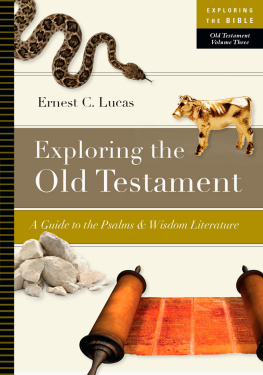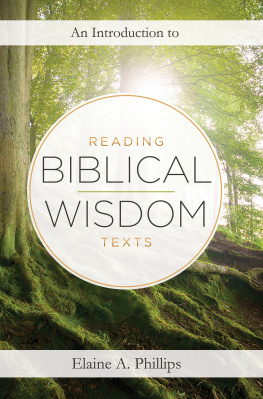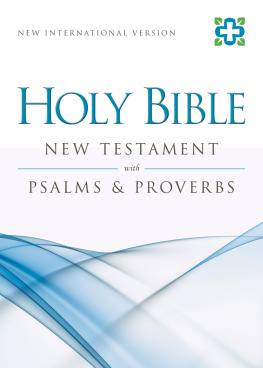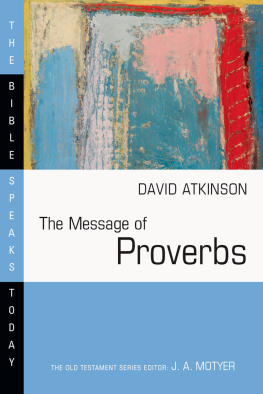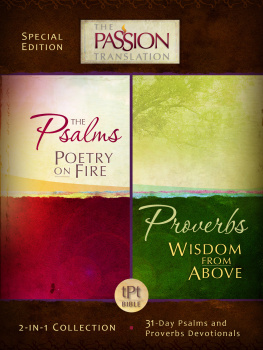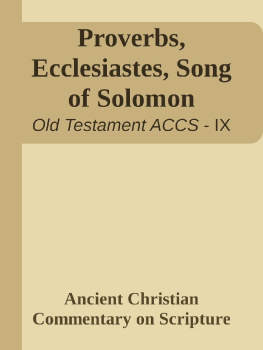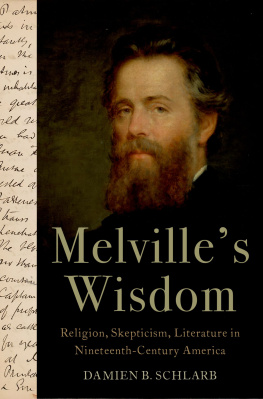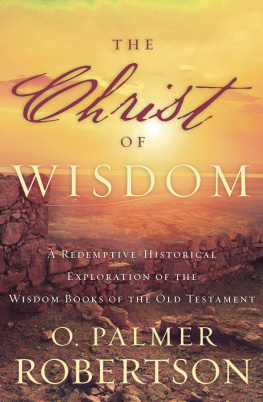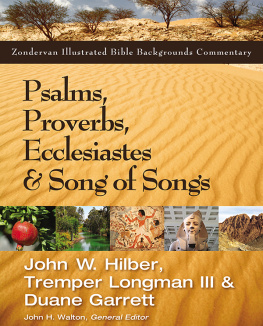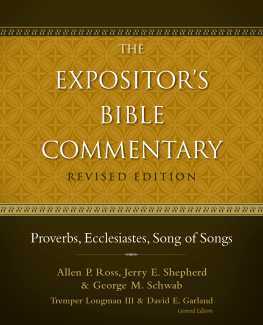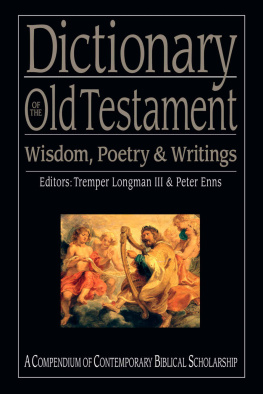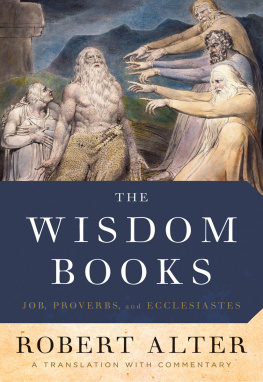EXPLORING THE OLD
TESTAMENT
Volume 3
The Psalms and Wisdom Literature
After working in biochemical research for a few years, Ernest Lucas studied theology at Oxford University and was ordained as a Baptist minister. He has been the minister of churches in Durham and Liverpool. While at Liverpool, he was awarded a Ph.D. by the university there for his research on the book of Daniel. For several years he worked as Education Director and the Associate Director at the London Institute for Contemporary Christianity. In 1994 he moved to Bristol Baptist College, an Affiliated College of Bristol University, where he is Vice-Principal and Tutor in Biblical Studies. Can We Believe Genesis Today? (IVP, 2001) and a commentary on Daniel (Apollos, 2002) are two of his recent publications. He is married and has two grown-up sons.
Exploring the Old Testament
The Pentateuch by Gordon Wenham
The Historical Books by Philip Satterthwaite and Gordon McConville
The Prophets by Gordon McConville
Exploring the New Testament
The Gospels and Acts by David Wenham and Steve Walton
The Letters and Revelation by Howard Marshall, Stephen Travis and Ian Paul
Exploring the
Old Testament
A Guide to the Psalms & Wisdom Literature
Ernest C. Lucas
InterVarsity Press
P.O. Box 1400, Downers Grove, IL 60515-1426
World Wide Web: www.ivpress.com
E-mail:
2003 by Ernest C. Lucas
Published in the United States of America by InterVarsity Press, Downers Grove, Illinois, with permission from the Society for Promoting Christian Knowledge, London, England.
All rights reserved. No part of this book may be reproduced in any form without written permission from InterVarsity Press.
InterVarsity Press is the book-publishing division of InterVarsity Christian Fellowship/USA, a student movement active on campus at hundreds of universities, colleges and schools of nursing in the United States of America, and a member movement of the International Fellowship of Evangelical Students. For information about local and regional activities, write Public Relations Dept., InterVarsity Christian Fellowship/USA, 6400 Schroeder Rd., P.O. Box 7895, Madison, WI 53707-7895, or visit the IVCF website at .
Scripture quotations, unless otherwise noted, are from the New Revised Standard Version of the Bible, copyright 1989 by the Division of Christian Education of the National Council of the Churches of Christ in the USA. Used by permission. All rights reserved.
Cover photograph: National Gallery, Budapest/SuperStock
ISBN 978-0-8308-9821-3 (digital)
ISBN 978-0-8308-5311-3 (print)
This digital document has been produced by Nord Compo.
KEY TO PANELS
This key to the panels helps locate the special and suggested exercises that occur throughout the volume. It should be noted that the panels are not exhaustive treatments of topics, and are meant to be read and used in their contexts. Panels sometimes cross-refer to other parts of the book.
THINK ABOUT PANELS
DIGGING DEEPER PANELS
OTHER PANELS
PREFACE
Exploring the Old Testament is designed to help the beginning student understand the writings of the Old Testament. It serves the purpose of an introduction, but its unique format is devised to make the volumes accessible to the modern reader. EOT engages with the reader, by interspersing interactive panels with the main text. These panels ask for responses, suggest lines of thought, give further information, or indicate ways in which particular topics might be followed up in more depth. This design aims to make the volumes useful either for independent study or as a class text.
EOT aims to show the relevance of Old Testament study both to theology and to modern life. Its four authors, each writing in areas in which they have previously published extensively, believe that the Old Testament has foundational significance for theology and Christian belief and practice.
For that reason EOT expressly aims to incorporate modern approaches to interpreting the text. While the traditional historical questions are given their due place, newer approaches such as canonical and rhetorical criticism are represented. It is hoped that this will enable the student to see the potential applications of the books of the Old Testament to modern life.
EOT is a companion series to Exploring the New Testament.
Gordon McConville
Series editor
INTRODUCTION
This book aims to help students study the Psalms and Wisdom Literature of the Old Testament. Like other volumes in the Exploring the Old Testament and Exploring the New Testament series, it is intended to give students a primary resource to enable them to study the texts independently. It provides an introduction to each book, which includes a survey of the main trends in recent study of the book. There is a basic textual study. For Job, Ecclesiastes (or Qoheleth) and the Song of Songs, this amounts to a basic commentary on the book. In the case of Proverbs 10 31, the nature of the material makes such a commentary problematic, since it would require discussion of many individual, unrelated proverbs. Instead of the basic commentary the discussion of the compilation of the book provides a general overview of each section, with Proverbs 1 9 discussed in more detail. In the case of the book of Psalms, a representative selection of psalms is discussed in some detail. The discussion of each book includes a survey of the main theological issues it raises and of various theological approaches to interpreting it. Quotations from the Bible in English are taken from the New Revised Standard Version, unless otherwise indicated.
The book is interactive. Interspersed through it are a number of panels. Some (Think about) encourage the student to think further about what has been learnt. Others (Digging deeper:) encourage further study of some issue dealt with in the main text. There are also some panels that simply provide background material to supplement the main text.
The book is intended to introduce students to a range of critical and interpretative literature on the Psalms and Wisdom Literature. Each chapter has an annotated list of further reading, covering commentaries and other works. Most of these are referred to in the chapter in question. Items marked with * are considered suitable as first ports of call. Others are more complex, or related to specific issues.
It might be asked whether the Psalms and Wisdom Literature have been put together for anything more than pragmatic reasons. One justification for putting them in one volume is the preponderance of Hebrew poetry in these books. Psalms and the Song of Songs consist purely of poetry. Job has a prose prologue and epilogue, but most of the book is in poetry. The Hebrew proverb is poetic in its form. Ecclesiastes contains some proverbs. Some scholars conclude that it also contains a few poems, but there is debate about just how much of the book is poetic in form. The Wisdom Literature proper of the Old Testament is usually limited to Job, Proverbs and Ecclesiastes. However, as we shall see, it can be argued that there are grounds for regarding the Song of Songs as at least a close relative to the Wisdom Literature. Also, the book of Psalms contains some wisdom psalms, though scholars debate just how many of them there are and some question the existence of this category.

